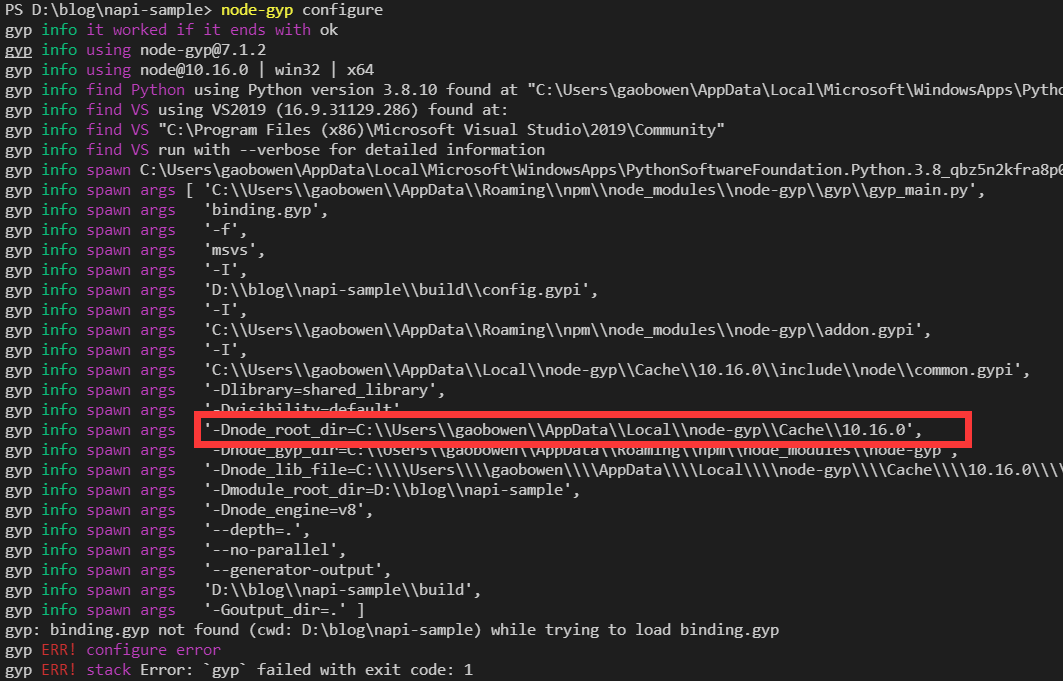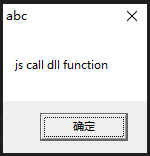Nodejs C++插件(N-API)
Nodejs C++插件(N-API)
N-API 作为Nodejs项目的一部分,旨在更加便捷稳定的创建Nodejs Native 插件。这个API作为应用二进制接口(ABI),在Node.js的各个版本中都是稳定的,而且ABI允许一个在主要版本编译的模块,在以后的Node.js版本上运行,而无需重新编译。
0. 环境搭建
- 安装最新的npm,且Nodejs版本10.x以上
- 工具链
- Windows执行
npm install --global windows-build-tools - MacOS执行
xcode-select --install - Linux使用系统自带的GCC即可
- Windows执行
- 安装构建工具
npm install --global node-gyp - 初始化测试项目
npm init - 添加napi模块
npm i node-addon-api - 为VSCode添加智能提示所需头文件(以Windows为例)
-
Ctrl+Shift+P-> C++ 添加c_cpp_properties.json文件 -
执行
node-gyp configure查看-Dnode_root_dir选项打印,确认node头文件目录

-
c_cpp_properties.jsonincludePath 中加入C:\\Users\\gaobowen\\AppData\\Local\\node-gyp\\Cache\\10.16.0\\include\\node
-
1. JS中调用C++方法
1.1 JS中调用源文件的C++方法
- 编写功能函数
test.h、test.cc
#ifndef SAMPLE_TEST_H
#define SAMPLE_TEST_H
#include <napi.h>
#include <windows.h>
#include <sstream>
#include <thread>
Napi::Value plus(const Napi::CallbackInfo& info);
#endif
#include "test.h"
Napi::Value plus(const Napi::CallbackInfo& info) {
Napi::Env env = info.Env();
Napi::EscapableHandleScope scope(env);
if (info.Length() < 1)
return Napi::Boolean::New(env, false);
if (!info[0].IsNumber())
return Napi::Boolean::New(env, false);
if (!info[1].IsNumber())
return Napi::Boolean::New(env, false);
auto a = info[0].As<Napi::Number>().DoubleValue();
auto b = info[1].As<Napi::Number>().DoubleValue();
return Napi::Number::New(env, a + b);
}
- 编写导出函数
exports.cc
#include <napi.h>
#include "test.h"
Napi::Object Init(Napi::Env env, Napi::Object exports)
{
exports.Set(Napi::String::New(env, "plus"), Napi::Function::New(env, plus));
return exports;
}
NODE_API_MODULE(napi_sample, Init)
- 添加
binding.gyp文件
{
"targets": [
{
"target_name": "napi_sample",
"sources": [ ],
"cflags!": [ "-fno-exceptions" ],
"cflags_cc!": [ "-fno-exceptions" ],
"defines": [ "NAPI_DISABLE_CPP_EXCEPTIONS" ],
"include_dirs": [
"<!--@(node -p \"require('node-addon-api').include\")"
],
"conditions": [
['OS=="win"', {
"sources": [ "sample/exports.cc", "sample/test.cc" ],
}]
]
}
]
}
- 命令行执行
node-gyp rebuild生成./build/Release/napi_sample.node文件 - 测试使用
napi_sample.node插件
node .\test.js
let { plus } = require('./build/Release/napi_sample.node');
console.log('test export=-->', plus);
console.log('test call=>', plus(1.2, 1.3));
控制台输出
test export=> function () { [native code] }
test call=> 2.5
1.2 JS中调用动态库的C++方法
Napi::Value call_dll(const Napi::CallbackInfo& info) {
Napi::Env env = info.Env();
Napi::EscapableHandleScope scope(env);
//注,若动态库还有其他依赖库,请放在同一级目录下
auto m = LoadLibraryExA("user32.dll", NULL, LOAD_WITH_ALTERED_SEARCH_PATH);
typedef int(*MyMessageBoxA)(int, char*, char*, int);
auto box = (MyMessageBoxA)GetProcAddress(m, "MessageBoxA");
box(0, "js call dll function", "abc", 0);
return Napi::Boolean::New(env, true);
}
控制台输出
test call_dll=> true

2. C++中调用JS方法
2.1. C++单线程调用JS方法
test.cpp
Napi::Value cpp_call_js(const Napi::CallbackInfo& info) {
Napi::Env env = info.Env();
Napi::EscapableHandleScope scope(env);
if (info.Length() < 0)
return Napi::Boolean::New(env, false);
if (!info[0].IsFunction())
return Napi::Boolean::New(env, false);
auto jscb = info[0].As<napi::function>();
//回调函数入参
napi_value a, b;
napi_create_double(env, 1, &a);
napi_create_double(env, 2, &b);
napi_value argv[] = { a, b };
//回调函数返回值
napi_value result;
napi_call_function(env, env.Global(), jscb, 2, argv, &result);
return Napi::Value(env, result);
}
test.js
let { cpp_call_js } = require('./build/Release/napi_sample.node');
(async function () {
let c = 3;
let js_callback = function(a, b){
return a + b + c;
}
console.log('test cpp_call_js=>', cpp_call_js(js_callback));
})();
控制台输出
test cpp_call_js=> 6
2.2. C++多线程调用JS方法
test.cpp
Napi::ThreadSafeFunction tsfunc;
void thread_function() {
auto threadid = std::this_thread::get_id();
std::stringstream ss;
ss << threadid;
auto threadidstr = new std::string(ss.str());
auto callback = [threadid](Napi::Env env, Napi::Function jscb, std::string* p_str) {
jscb.Call({ Napi::String::New(env, *p_str) });
delete p_str;
};
tsfunc.Acquire();
napi_status status = tsfunc.BlockingCall(threadidstr, callback);
if (status != napi_ok) {
printf("tsfunc.BlockingCall error.\n");
}
tsfunc.Release();
}
Napi::Value cpp_thread_call_js(const Napi::CallbackInfo& info) {
Napi::Env env = info.Env();
Napi::EscapableHandleScope scope(env);
if (info.Length() < 0)
return Napi::Boolean::New(env, false);
if (!info[0].IsFunction())
return Napi::Boolean::New(env, false);
auto jscb = info[0].As<napi::function>();
tsfunc = Napi::ThreadSafeFunction::New(env, jscb, "my-tsfunc", 2, 2);
std::thread(thread_function).join();
std::thread(thread_function).join();
return Napi::Boolean::New(env, true);
}
test.js
let { cpp_thread_call_js } = require('./build/Release/napi_sample.node');
(async function () {
let js_callback_async = function(id){
console.log('thread_id',id);
}
console.log('test cpp_thread_call_js=>', cpp_thread_call_js(js_callback_async));
})();
控制台输出
test cpp_thread_call_js=> true
thread_id 6768
thread_id 12352



【推荐】还在用 ECharts 开发大屏?试试这款永久免费的开源 BI 工具!
【推荐】国内首个AI IDE,深度理解中文开发场景,立即下载体验Trae
【推荐】编程新体验,更懂你的AI,立即体验豆包MarsCode编程助手
【推荐】抖音旗下AI助手豆包,你的智能百科全书,全免费不限次数
【推荐】轻量又高性能的 SSH 工具 IShell:AI 加持,快人一步